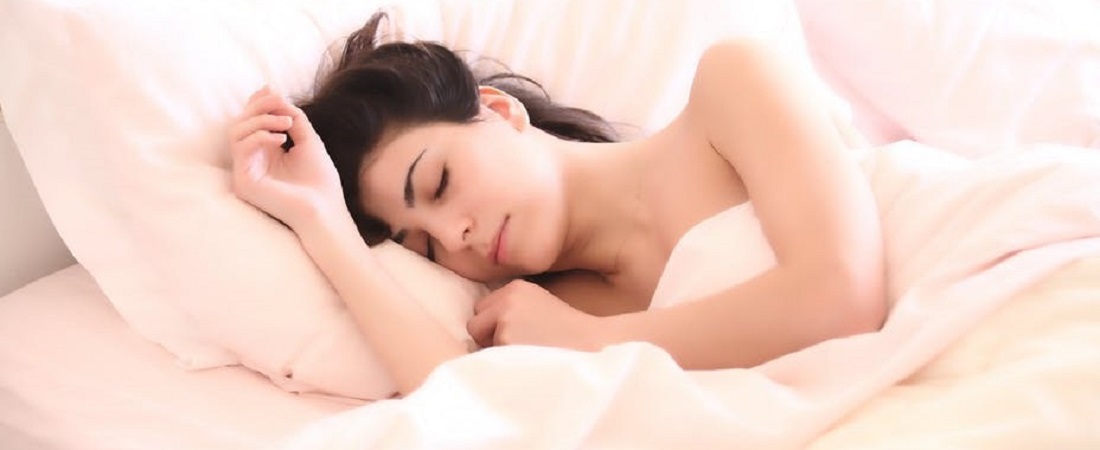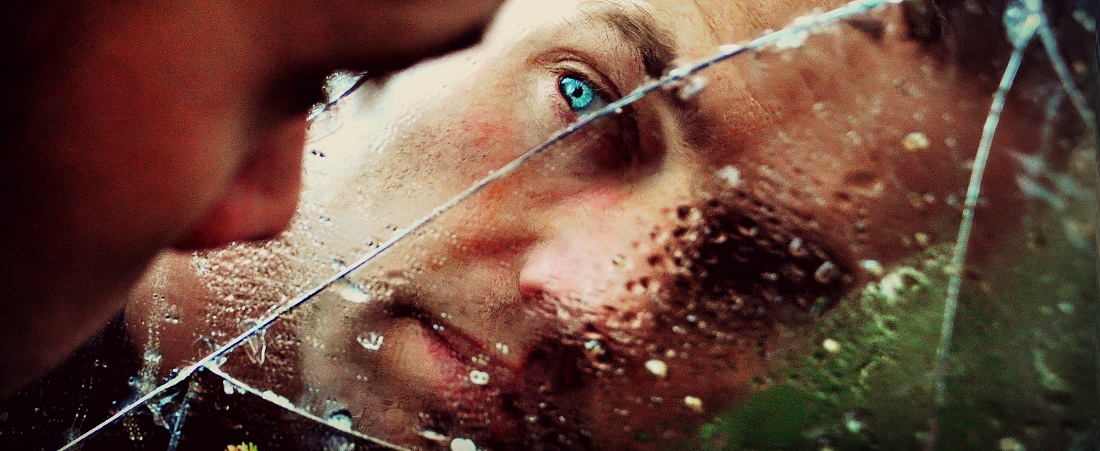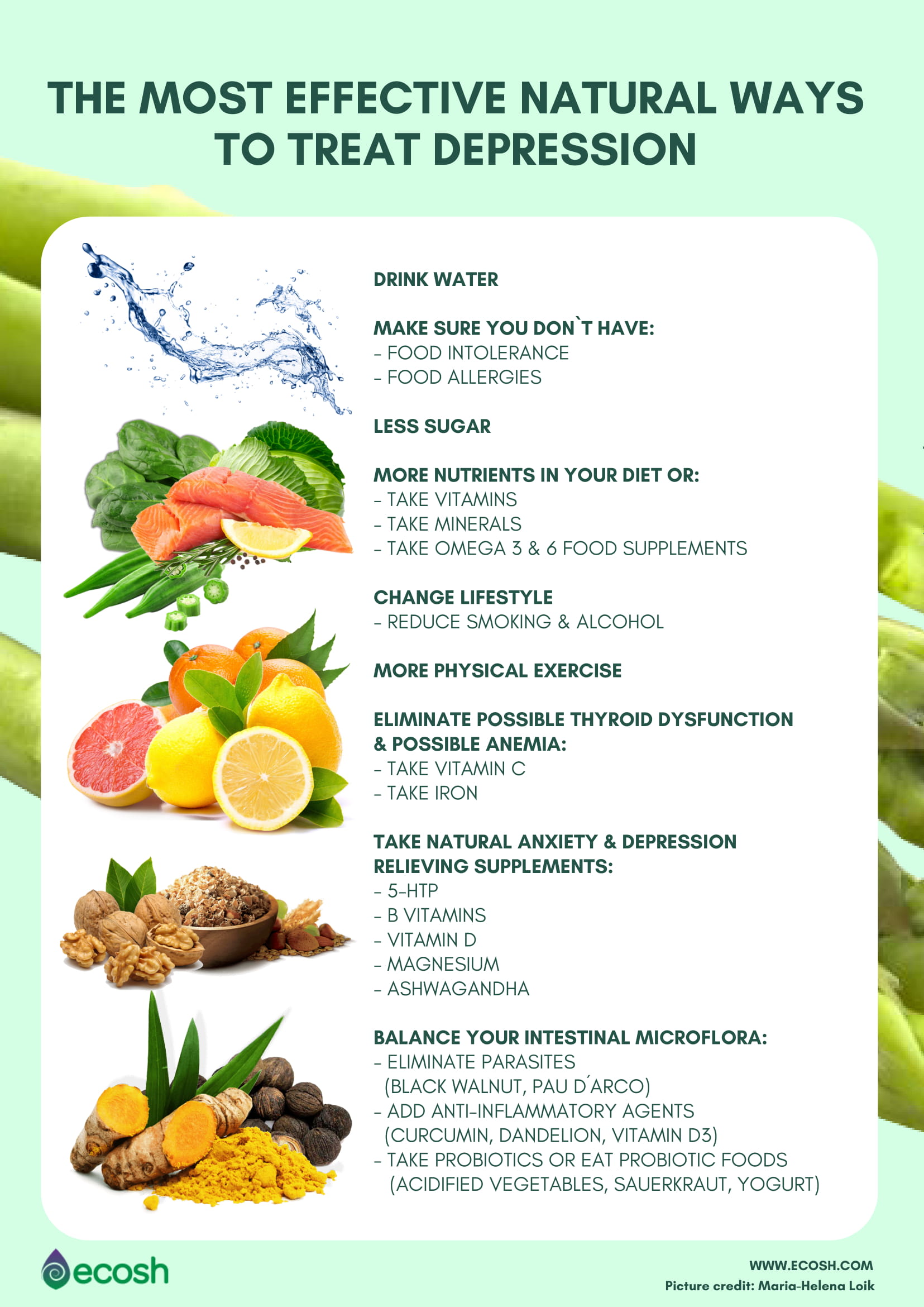DEPRESSION – SYMPTOMS, CAUSES, WARNING SIGNS AND 9 WAYS TO TREAT DEPRESSION NATURALLY WITHOUT MEDICATION
More and more people in the U.S. suffer from different kinds of depression types such as major depressive episode (6,7 % of U.S. adults in a given year), persistent depressive disorder (1.5 % of U.S. adults in a given year), bipolar disorder (2.8 % of the U.S. people in a given year), seasonal depression (5 % of the U.S. people in a given year), and postpartum depression (80 % of new mothers) (1, 2, 3, 4, 5). Why is it like that and is there something you could do about that?
Feel the emotions – sadness, fear, agony or irritation is a normal part of human nature. However, if you leave these feelings unsolved or untold, depression may result.
The most common, confident, and correct way to heal depression, is to let your doctor prescribe antidepressants. And do not get us wrong, it might be, and usually is the only way to treat depression. However, as we see it, there’s a lot you can do on your own to fight back. Changing your physical activity, lifestyle, mindset, and your diet – are all-natural depression relievers.
These 9 tips and suggestions below may help you feel better in case you don’t have severe depression. However, if you feel that the depression is already taken over, and you do not have the energy to fight back, consult your doctor immediately.

Unreleased and Unresolved Feelings
The word depression comes from the word depress which stands for suppression. So, one of the reasons which may eventually trigger depression might be traumas that we have been suppressed and set aside.
This means pushing down unspoken feelings because of not knowing how to deal with certain feelings and situations. Sometimes a person even does not know to suspect having some unspoken feelings, because the problem sits too deep.
This negative energy starts to look for an exit and usually reveals itself as fear, mood disorder, depression, anxiety, stress, and so on. With anxiety and depression, your body simply shows that the problem needs a solution, and needs it fast.
Therefore, healing from depression requires a lot of soul searching and being honest with yourself. Sometimes even being brutally honest, and looking at your thoughts, feelings, acting patterns, or events that you do not want to see.
However, people often just do not have time to think about their thoughts and organize their so-called internal files. Just as it is necessary occasionally to organize your files on the computer, it is also necessary to organize your inner world.
The best and fastest way to heal is to talk with a professional, as in most cases depression requires support from others and also suitable medication.

Depression Causes
Depression can be caused by several risk factors, such as:
- Genetics, family history or personal history of mental illness
- The environment
- Life-threatening lifestyle
- Complex and incomplete relationships
- Unresolved emotional problems
- Lack of nutrients in the body
- Misuse of drugs or alcohol
- Brain structure, lack of balance of brain chemistry
- Early childhood trauma
- Stressful events, such as loss of a loved one, economic problems, or a divorce
- Medical and health conditions. For example, chronic illness, insomnia, chronic pain, or attention-deficit hyperactivity disorder (ADHD)
- Low self-esteem or being self-critical
- Certain medications (6)
All of these reasons listed above need solutions or professional help.

Depression Types – The Beginning and a Process of Depression
Depression is generally sneaky at the start. Persistent mood disorders cause disability, impair the quality of life, and begin to interfere with your daily routines. Experiencing mood disorders can be unpleasant for those affected and their family. But it can also be a potentially dangerous situation leading to other health complications or even self-harm.
Types of depression:
- Major Depression: when you have symptoms of depression most of the day, almost every day for at least two weeks that stand in the way of your capability to sleep, work, study, eat, and enjoy life. This can happen only once in a person’s lifetime, but more often, a person may have several episodes.
- Persistent Depressive Disorder (Dysthymia): when you have symptoms of depression that last for at least 2 years. When diagnosed with dysthymia, you may have episodes of major depression along with periods of less severe symptoms.
- Perinatal Depression (postpartum depression): depression symptoms during pregnancy or after delivery.
- Psychotic Depression or Severe Depressive Episode With Psychotic Symptoms: when you have some form of psychosis in addition to severe depression. For example, having disturbing false fixed beliefs (delusions) or hearing or seeing things that others cannot hear or see (hallucinations).
- Bipolar Disorder or Manic Depression: bipolar disorder or manic-depressive disorder (the old name of bipolar disorder) involves the highs (mania) and lows (depression). The presence of these episodes is what determines which type of bipolar disorder is diagnosed.
Other types of depression:
- Seasonal Affective Disorder (SAD): when symptoms of depression affect you at the same time of year, typically starting in the late fall and early winter and going away during the spring and summer.
- Situational Depression or Reactive Depression: when symptoms of depression are caused by stressful events in your life. For example, divorce, loss of job, or money problems. Situational depression is sometimes separated from an adjustment disorder, where you may struggle with some symptoms of depression because of adapting to a major change in your life. Such as separation from people, retirement, or migrating to a new area
- Premenstrual Dysphoric Disorder (PMDD): the symptoms of PMDD are more severe than the symptoms of premenstrual syndrome (PMS), and may get it the way of day-to-day functions.
- Atypical Depression: depression that temporarily goes away in response to positive events (1, 7, 8, 9, 10, 11).
- Cyclothymia: when you have unstable moods (highs and lows) similar to bipolar disorder, but these periods of depression or elation are not severe enough or long enough to diagnose bipolar disorder.

Common Symptoms and Warning Signs of Depression
Depressive disorders are characterized by a persistent feeling of:
- Sadness or hopelessness. Feelings of worthlessness, helplessness, hopelessness, and/or guilt. You harshly criticize yourself for perceived faults and mistakes.
- Lack of concentration or lack of judgment. Trouble focusing, making decisions or remembering things.
- Thoughts of death or suicide or suicide attempts
- Functional impairment of daily social and work activities.
- Persistent sad, anxious, or “empty” mood
- Feelings of hopelessness, pessimism, guilt, worthlessness, or helplessness.
- Loss of interest or pleasure in hobbies, daily activities, and relationships. You don’t care anymore about former hobbies, pastimes, social activities, or sex. You’ve lost your ability to feel joy.
- Lack of energy. Feeling fatigued, sluggish, physically drained, or being “slowed down”. Your whole body may feel heavy, and even small tasks are exhausting or take longer to complete.
- Insomnia (sleep problems) or hypersomnia (excessive sleepiness during the day). Difficulty sleeping, early-morning awakening, or oversleeping
- Appetite and/or weight changes. Significant weight loss or weight gain—a change of more than 5% of body weight in a month.
- Restlessness or irritability
- Unexplained aches or pains. An increase in physical complaints such as headaches, back pain, aching muscles, and stomach pain, headaches, cramps, or digestive problems without a clear physical cause and/or that do not ease even with treatment
- The mood of depression lasts for most of the day.
- Anger or irritability. Feeling agitated, restless, or even violent. Your tolerance level is low, your temper short, and everything and everyone gets on your nerves.
- Reckless behavior. You engage in escapist behavior such as substance abuse, compulsive gambling, reckless driving, or dangerous sports (7, 8).

Relationship Between Stress and Other Health Conditions
Stress directly affects the nervous system, which is closely related to the intestinal activity. The nervous system can be divided into two – sympathetic and parasympathetic.
The sympathetic nervous system assures the functioning of the body in stress or dangerous situations. Parasympathetic when the body is at rest. In a state of danger, the body seems to be freezing – you have to decide whether to fight or escape because stress signals the brain the danger. The sympathetic nervous system turns on.
When the sympathetic nervous system launches, the body sends all the resources (blood supply, energy, nutrients) to the head and muscles to instantly find the power to fight or escape. This condition is at the charge of all other systems of the body (12).
In case of constant stress, the blood supply to the digestive system and the transport of nutrients to the tissues and cells is disrupted because all the attention and energy is constantly on the muscles. It also exhausts the muscles and may cause inflammation of the body (13).
Continual muscle tension sooner or later leads to muscle stiffness and pain. Therefore, it has been suggested that stress may also lead to fibromyalgia (muscle tension and pain) (14, 15). However, there has been suspected that magnesium deficiency may also be linked with muscle tension (22).
Tight muscles do not pass through water, blood, or energy well, and that in turn may lead to other health conditions. So, stress seems to worsen or increase the risk of health conditions like obesity, metabolic syndrome, heart disease, Alzheimer’s disease, diabetes, depression, gastrointestinal problems, asthma, and accelerated aging (16, 19, 27).
In addition, in a state of stress, when blood supply is elsewhere, people also have no sexual desire (17). The sexual desire arises in a relaxed and restful state. Severe life stress may also cause cell damage (oxidative stress), as nutrients, water and oxygen simply will not reach cells in sufficient amounts (18).
When cells are hungry and collapsing, one cannot be happy and in a good mood. Adding one-sided unhealthy and nutrient-poor diets, little water, and movement to this can lead to serious chronic illnesses. Therefore, dealing with your stress might be the first important thing for your overall health.
Natural Ways to Relieve Stress and Help Treat Depression Naturally
These tips below may benefit your nervous system and support your depression treatment.
1. Change Lifestyle
Reduce Smoking, alcohol, and coffee.
2. Healthy Diet
Look over your diet, because you might have some food intolerance or allergies. In the case of food intolerance, the non-digestible food might be a poison on your body that adversely affects the nervous system. Wheat, dairy, sugar, and meat products are the main foods that may usually cause intolerance.
3. Less Sugar
Consuming sugar products may cause acidification and inflammation of the body.

4. Vitamins, Minerals, Fats, and Amino Acids
Let your levels of vitamins, minerals, fat, and amino acids be measured as much as possible. In case of nutrient deficiency, your body simply has no energy to keep itself running and build itself up.
For example, if a person does not eat fats such as fish oil, olive oil, hemp oil, walnut oil (omega 3, 6, 9 fats), the brain is panicked because there are no essential substances for brain cells and brain activity, as brain cells consist a large number of fats and need fats to work.
The lack of magnesium and B vitamins may cause disturbances in the nervous system eventually causing anxiety, irritability, and so on. According to a study, B vitamins may be helpful in case of occupational stress. According to another study, there is also strong data for the role of magnesium in migraine and depression. (20, 21). Although, in case of stress you might benefit from both – B vitamins and magnesium, do not start to self-medicate and firstly consult your doctor.
5. More Water
A person consists of 60-70% water. So if there is no water, no process in the body can function, as absolutely every part of the body and cell need water.

6. Physical Exercise
Move more! Physical movement is one of the most beneficial tools for releasing negative energies and a hormone serotonin manufacturer. Exercise burns the sugar (calories), and burning sugar (carbohydrate) releases energy in the body. The more movement and oxygen, the more the mitochondria “cell power stations” in the body cells are generated. They are responsible for energy production.
7. Eliminate Possible Thyroid Dysfunction and Possible Anemia
Eliminate the possibility of thyroid dysfunction and anemia. Because vitamin C and iron deficiency, yeast infections, and dysbacteriosis are diseases that may also lead to sleep and anxiety disorders, and depression.
8. Natural Stress and Anxiety-relieving Supplements
In less severe cases, you can try natural anxiety-relieving supplements. However, before starting to self-medicate, first consult your doctor, as you might need prescription medications.
All these substances are very much involved in the work of the nervous system, in the absence of which nervous system disorders and damage may occur (20, 21, 23, 24, 25, 26).

9. Balance and Restore Your Intestinal Microflora
In addition, the intestinal microflora might be more important than you think, as microbial imbalance such as dysbiosis may also lead to lower stress tolerance and depression (26, 28).
- Cleansing the intestines (fine and large intestines) with high-fiber foods or food supplements.
- Eliminating parasites with antiparasitic plants (pumpkin seeds, black walnut, Neem, Pau D´Arco).
- Adding anti-inflammatory agents such as curcumin (also used to treat depression), dandelion, vitamin D3.
- Replacing harmful bacteria with useful by eating probiotic foods such as acidified vegetables, sauerkraut, sour milk made from raw milk, and kefir.
- However, acidified products may not provide the necessary amount of probiotic culture to cover the entire intestinal tract with beneficial bacteria. In this case, you may also use probiotics e. lactic acid bacteria as a dietary supplement.
Useful lactic acid bacteria are responsible for:
- Protecting the intestinal wall.
- Disintegrating and grinding food.
- Neutralizing harmful germs.
- Removing poison and debris.
- Maintaining our mental and physical health.
Go, if necessary, to a psychologist or therapist who can help clear up and relieve internal traumas and fears. If depression has developed into very serious symptoms, let your doctor prescribe antidepressants to help to control the situation for a moment and gain time to find solutions.
NB! The information provided here is for informational purposes only, so do not consider it as health care or medical diagnosis and treatment. Do not consider this information as a guarantee of the results you want to achieve. In addition, this information is not intended to replace the advice of your physician or other healthcare professional.
Even more, you should not use it to diagnose or treat a health problem. Before changing or discontinuing your existing medication, treatment, or care, or taking any dietary supplements, be sure to consult with your healthcare professional or doctor before starting any diet or program, or if you suspect you may have a medical condition.
Compiled by Maria-Helena Loik
This article was originally posted on Ecosh.com
Pictures: Pexels.com, Pixabay.com, Shutterstock.com
Sources:
- https://www.healthline.com/health/depression/facts-statistics-infographic#Types-of-depression
- https://www.nimh.nih.gov/health/statistics/persistent-depressive-disorder-dysthymic-disorder.shtml
- https://www.nimh.nih.gov/health/statistics/bipolar-disorder.shtml
- https://www.mhanational.org/conditions/seasonal-affective-disorder-sad
- https://www.nimh.nih.gov/health/publications/perinatal-depression/index.shtml
- https://www.healthline.com/health/depression#causes
- https://www.nimh.nih.gov/health/publications/depression/index.shtml
- https://www.rethink.org/a

